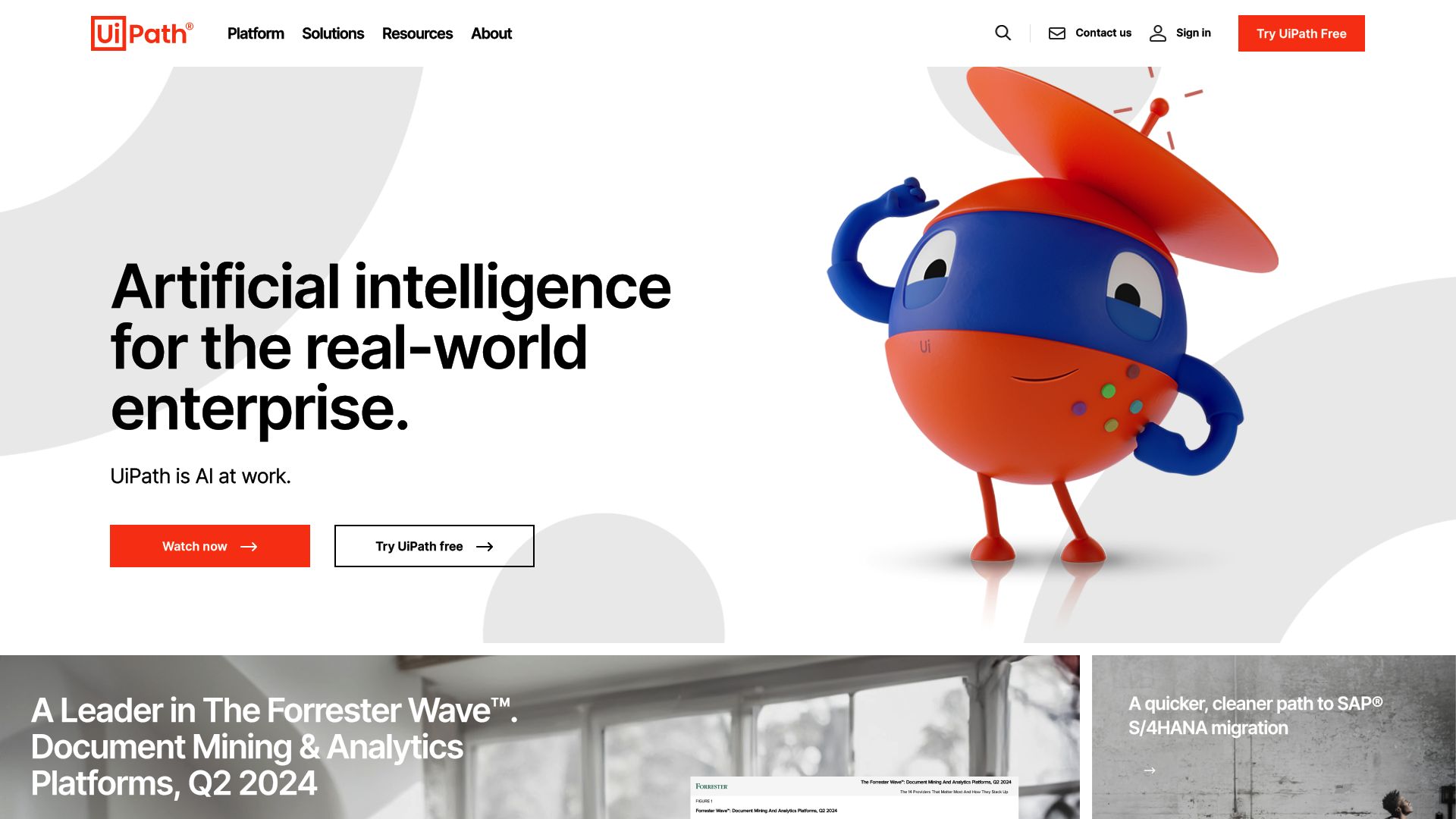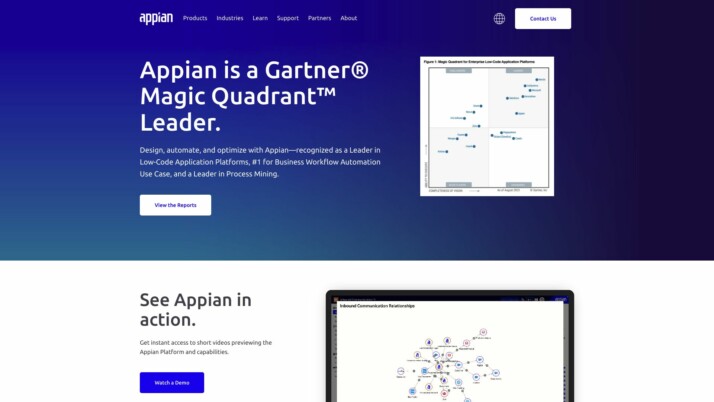UiPath vs. Appian: AI-Driven Automation Showdown
Artificial intelligence reshapes business processes, sparking a race for powerful, accessible automation solutions. UiPath vs. Appian stand out as leaders, each offering unique approaches to AI-driven efficiency. UiPath excels in robotic process automation, streamlining repetitive tasks for large enterprises. Appian shines with its low-code platform, democratizing AI application development. This comparison delves into their strengths, limitations, and ideal use cases, helping you navigate the complex landscape of enterprise AI tools. We’ll explore how these platforms tackle workflow automation, AI integration, and security, and introduce SmythOS as a compelling alternative that combines the best of both worlds.
UiPath Overview
UiPath stands at the forefront of enterprise automation, offering a comprehensive platform that empowers organizations to streamline operations through intelligent software robots. The company’s flagship product, the UiPath Platform, combines robotic process automation (RPA) with artificial intelligence to automate repetitive tasks and complex business processes.
UiPath stands at the forefront of enterprise automation, offering a comprehensive platform that empowers organizations to streamline operations through intelligent software robots.
UiPath caters primarily to large enterprises and organizations seeking to enhance productivity and reduce operational costs. Its platform excels in automating rule-based tasks across various departments, including finance, human resources, and customer service. UiPath’s vision centers on creating a world where human workers are liberated from mundane tasks, allowing them to focus on more strategic, creative endeavors.


Key features of the UiPath Platform include UiPath Studio for visual process design, UiPath Robots for task execution, and UiPath Orchestrator for centralized management of automation workflows. The platform’s AI capabilities, integrated through UiPath AI Center, enable the processing of unstructured data and the handling of more complex decision-making scenarios.
While UiPath offers powerful automation tools, its enterprise focus may present a steep learning curve for smaller organizations or individual users. The platform’s complexity can require significant time investment for full mastery, potentially slowing initial implementation. Additionally, the cost structure may be prohibitive for smaller businesses or those with limited automation needs.
UiPath integrates seamlessly with a wide range of enterprise systems and applications, enhancing its utility across diverse IT environments. The platform’s scalability allows organizations to start small and expand their automation initiatives as needed. UiPath’s strong market position and continuous innovation in AI and machine learning position it as a leader in the RPA and intelligent automation space, though competition from other vendors continues to intensify in this rapidly evolving market.
Appian Overview
Appian revolutionizes business process automation by seamlessly integrating artificial intelligence into its low-code platform. The company empowers organizations to build sophisticated AI-driven applications without extensive coding expertise, democratizing access to advanced technologies.
At the core of Appian’s offering is its AI Skill Designer, which allows users to create custom AI models using intuitive visual interfaces. This tool opens up possibilities for businesses to harness AI’s power across various domains, from document processing to customer service enhancement. Appian’s commitment to data privacy shines through its approach to AI development, ensuring that models and data remain securely within the user’s control.


Appian revolutionizes business process automation by seamlessly integrating artificial intelligence into its low-code platform.
Appian stands out with its pre-built AI capabilities, including document classification, extraction, and email sorting. These features accelerate implementation timelines and reduce the technical barriers to entry for AI adoption. The platform’s integration with generative AI technologies, such as OpenAI’s ChatGPT, further expands its capabilities, enabling advanced natural language processing for tasks like automated email communication and intelligent document management.
The Enterprise Copilot feature exemplifies Appian’s innovation in making AI practical for everyday business use. By allowing users to create knowledge sets from curated documents, it facilitates rapid information retrieval, enhancing decision-making processes across organizations. This tool embodies Appian’s vision of AI as a seamless component of business operations, augmenting human capabilities rather than replacing them.
Appian’s approach to AI integration within a comprehensive process automation platform positions it as a versatile solution for businesses looking to enhance efficiency and innovation. However, users should consider the learning curve associated with fully leveraging the platform’s capabilities, especially for complex AI implementations. While Appian offers significant potential for transforming business processes, realizing its full value may require a strategic approach to implementation and ongoing optimization.
Feature Comparison
UiPath and Appian diverge significantly in their core capabilities and security features. UiPath specializes in robotic process automation (RPA) with a focus on structured workflow automation, while Appian excels in low-code application development with integrated AI capabilities.
UiPath’s strength lies in its comprehensive RPA toolkit, offering robust visual builders and extensive API integrations. However, it lacks native support for autonomous agents and multimodal interactions. In contrast, Appian provides a more versatile platform for AI-driven application development, including features like the AI Skill Designer and Enterprise Copilot, which UiPath does not offer.
Security-wise, both platforms prioritize data protection, but their approaches differ. UiPath emphasizes orchestration and governance through its Orchestrator tool, while Appian focuses on private AI models and data privacy. Appian’s commitment to keeping AI models and data within the user’s control gives it an edge in scenarios where data sovereignty is crucial.
Feature Comparison Table
| UiPath | Appian | SmythOS | |
|---|---|---|---|
| CORE FEATURES | |||
| AI Agents | ❌ | ✅ | ✅ |
| Hosted Agents (Dev, Production) | ❌ | ❌ | ✅ |
| No-Code Options | ❌ | ✅ | ✅ |
| Memory & Context | ❌ | ✅ | ✅ |
| Autonomous Agents | ❌ | ❌ | ✅ |
| Explainability & Transparency | ❌ | ✅ | ✅ |
| Multimodal | ❌ | ✅ | ✅ |
| Problem-Solving Capabilities | ❌ | ✅ | ✅ |
| Multi-Agent Collaboration | ❌ | ❌ | ✅ |
| Work as Team | ❌ | ✅ | ✅ |
| Agent Work Scheduler | ✅ | ❌ | ✅ |
| SECURITY | |||
| Constrained Alignment | ❌ | ✅ | ✅ |
| COMPONENTS | |||
| Foundation AIs | ❌ | ❌ | ✅ |
| Huggingface AIs | ❌ | ❌ | ✅ |
| Zapier APIs | ❌ | ❌ | ✅ |
| Classifiers | ❌ | ✅ | ✅ |
| Data Lakes | ❌ | ✅ | ✅ |
| DEPLOYMENT OPTIONS (EMBODIMENTS) | |||
| Deploy as API | ❌ | ✅ | ✅ |
| Deploy as Webhook | ❌ | ✅ | ✅ |
| Staging Domains | ❌ | ✅ | ✅ |
| Production Domains | ❌ | ✅ | ✅ |
| Deploy as Site Chat | ❌ | ❌ | ✅ |
| Deploy as Scheduled Agent | ❌ | ❌ | ✅ |
| Deploy as GPT | ❌ | ❌ | ✅ |
| DATA LAKE SUPPORT | |||
| Hosted Vector Database | ❌ | ❌ | ✅ |
| Sitemap Crawler | ❌ | ❌ | ✅ |
| YouTube Transcript Crawler | ❌ | ❌ | ✅ |
| URL Crawler | ❌ | ❌ | ✅ |
| TXT File Support | ❌ | ✅ | ✅ |
Best Alternative to UiPath and Appian
SmythOS stands out as the superior alternative to UiPath and Appian for AI agent development and deployment. Our platform combines powerful features with unparalleled ease of use, offering a comprehensive solution that outshines both competitors.
We’ve designed SmythOS to address the limitations of traditional automation platforms. Unlike UiPath’s focus on structured workflow automation, our system enables the creation of truly autonomous AI agents capable of handling complex, dynamic tasks. Appian’s low-code approach to AI integration is a step in the right direction, but SmythOS takes it further by offering a visual drag-and-drop interface that makes advanced AI development accessible to users of all skill levels.
SmythOS takes it further by offering a visual drag-and-drop interface that makes advanced AI development accessible to users of all skill levels.
Our platform’s standout feature is its ability to support multi-agent collaboration, a capability absent in both UiPath and Appian. This allows for the creation of sophisticated AI ecosystems where multiple agents work together seamlessly, dramatically expanding the scope and complexity of tasks that can be automated.
SmythOS also excels in deployment flexibility. While Appian offers some API deployment options, we provide a wider range of deployment choices including API, webhook, site chat, scheduled agents, and even deployment as GPT models. This versatility ensures that AI agents built with SmythOS can be easily integrated into any existing infrastructure or workflow.
In terms of data handling and AI model support, SmythOS again takes the lead. Our platform supports a hosted vector database and integration with a variety of AI models from providers like OpenAI, Anthropic, and Hugging Face. This extensive support, combined with our robust data lake capabilities, enables the development of AI agents with unparalleled intelligence and problem-solving abilities. Whether you’re automating customer service, data analysis, or complex decision-making processes, SmythOS provides the tools and flexibility to create AI solutions that drive real business value.
Conclusion
UiPath and Appian offer powerful automation solutions, each with distinct strengths. UiPath excels in robotic process automation, providing comprehensive tools for enterprises to streamline operations. Its visual process design and centralized management make it a go-to choice for large organizations seeking to automate rule-based tasks at scale. Appian, on the other hand, shines in low-code AI integration, empowering businesses to build sophisticated AI-driven applications without extensive coding expertise.
While both platforms have their merits, SmythOS emerges as the superior choice for organizations looking to harness the full potential of AI-driven automation. Our platform combines the best of both worlds — the ease of use found in low-code environments with the power and flexibility of advanced AI capabilities. SmythOS’s drag-and-drop interface, extensive integration ecosystem, and versatile deployment options make it unparalleled in the market.
Unlike UiPath and Appian, SmythOS offers true multi-agent collaboration, allowing teams of AI agents to work together on complex tasks. Our platform’s support for a wide range of AI models, including those from OpenAI, Anthropic, and Hugging Face, provides unmatched flexibility. With features like autonomous agents, multimodal interactions, and problem-solving capabilities, SmythOS takes automation to the next level.
We invite you to experience the future of AI-powered automation with SmythOS. Explore our diverse range of AI-powered agent templates to jumpstart your journey, or create a free SmythOS account to build unlimited AI agents at no cost. With our 30-day money-back guarantee, you can revolutionize your workflow risk-free. Don’t just automate — innovate with SmythOS, where creating and deploying AI agents is 99% faster and more accessible than ever before.
Last updated:
Disclaimer: The information presented in this article is for general informational purposes only and is provided as is. While we strive to keep the content up-to-date and accurate, we make no representations or warranties of any kind, express or implied, about the completeness, accuracy, reliability, suitability, or availability of the information contained in this article.
Any reliance you place on such information is strictly at your own risk. We reserve the right to make additions, deletions, or modifications to the contents of this article at any time without prior notice.
In no event will we be liable for any loss or damage including without limitation, indirect or consequential loss or damage, or any loss or damage whatsoever arising from loss of data, profits, or any other loss not specified herein arising out of, or in connection with, the use of this article.
Despite our best efforts, this article may contain oversights, errors, or omissions. If you notice any inaccuracies or have concerns about the content, please report them through our content feedback form. Your input helps us maintain the quality and reliability of our information.
